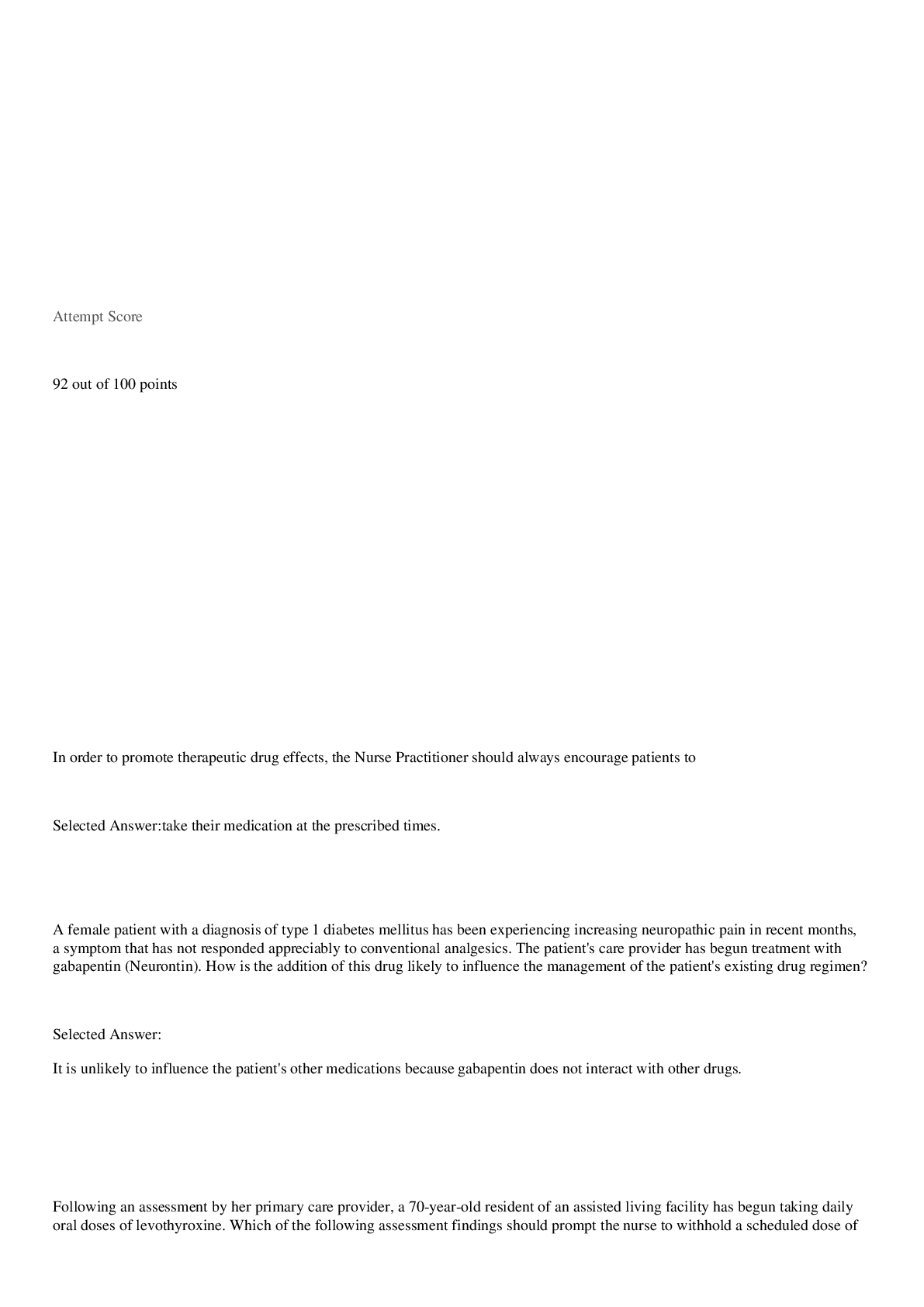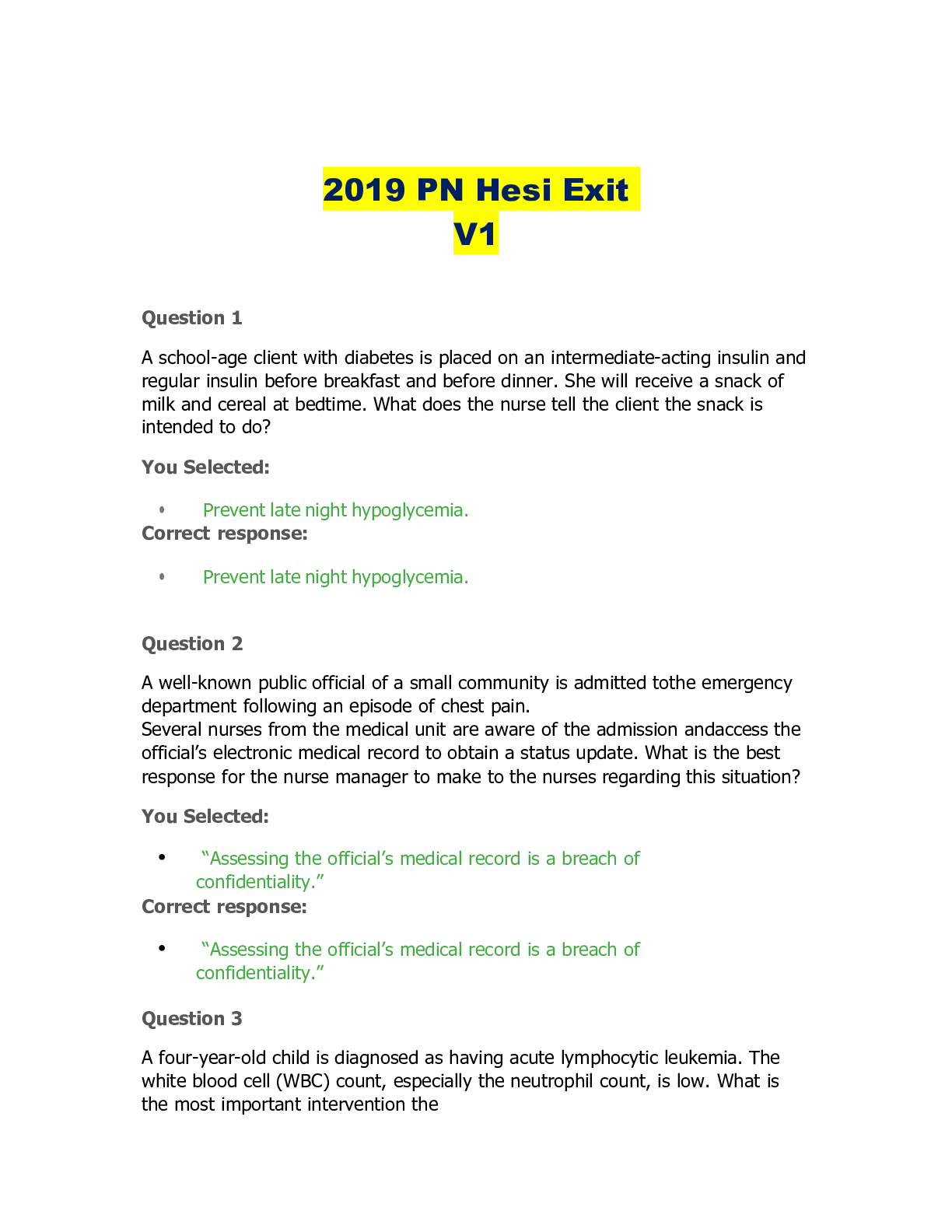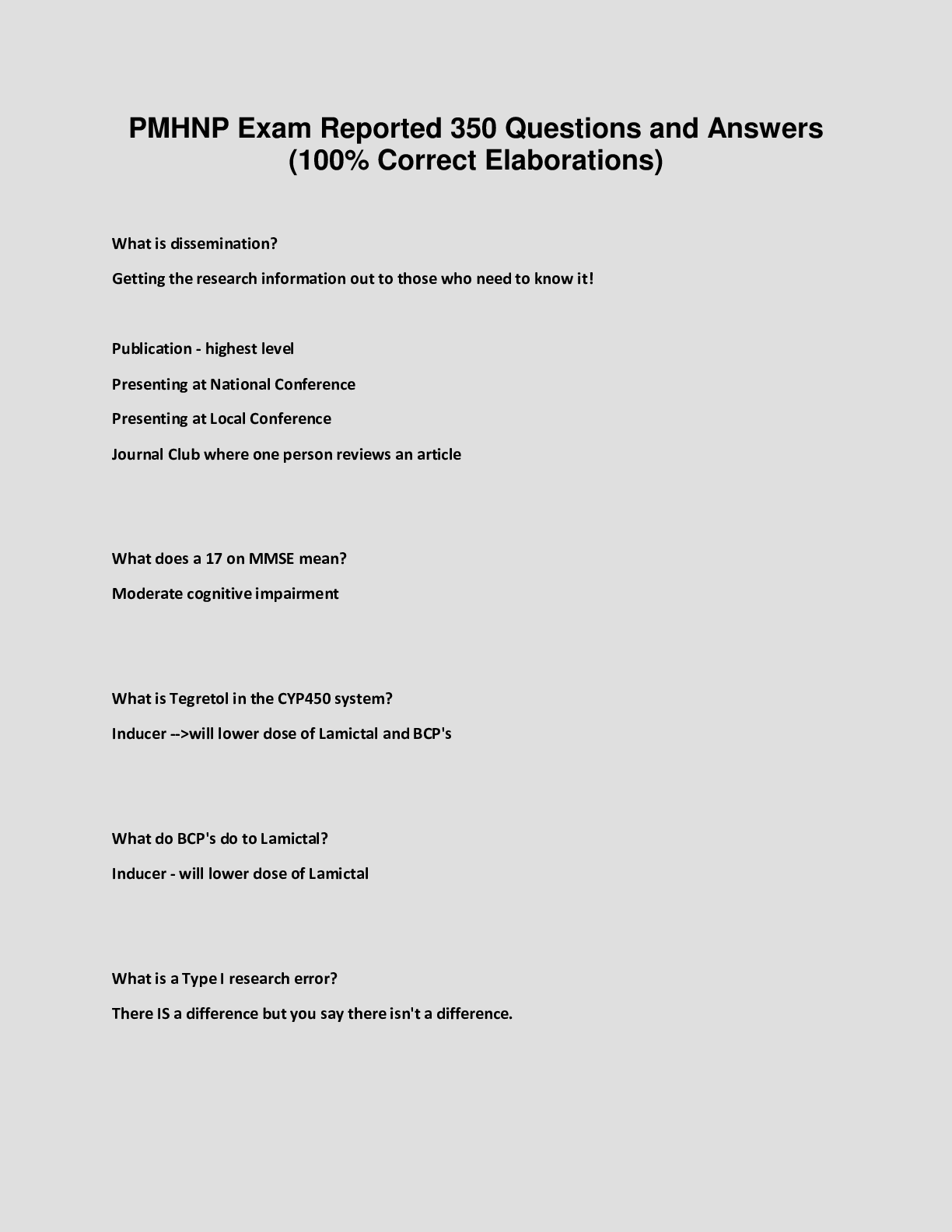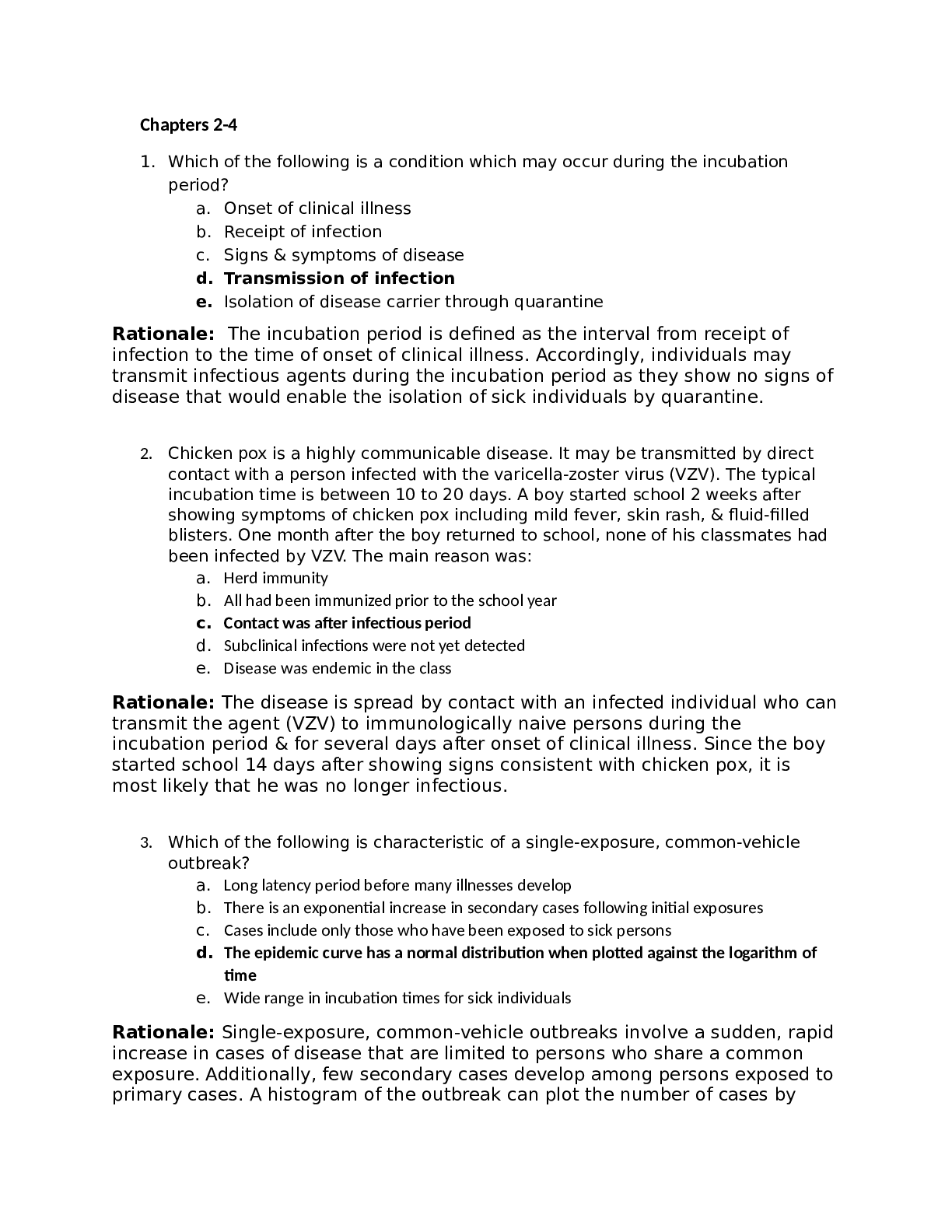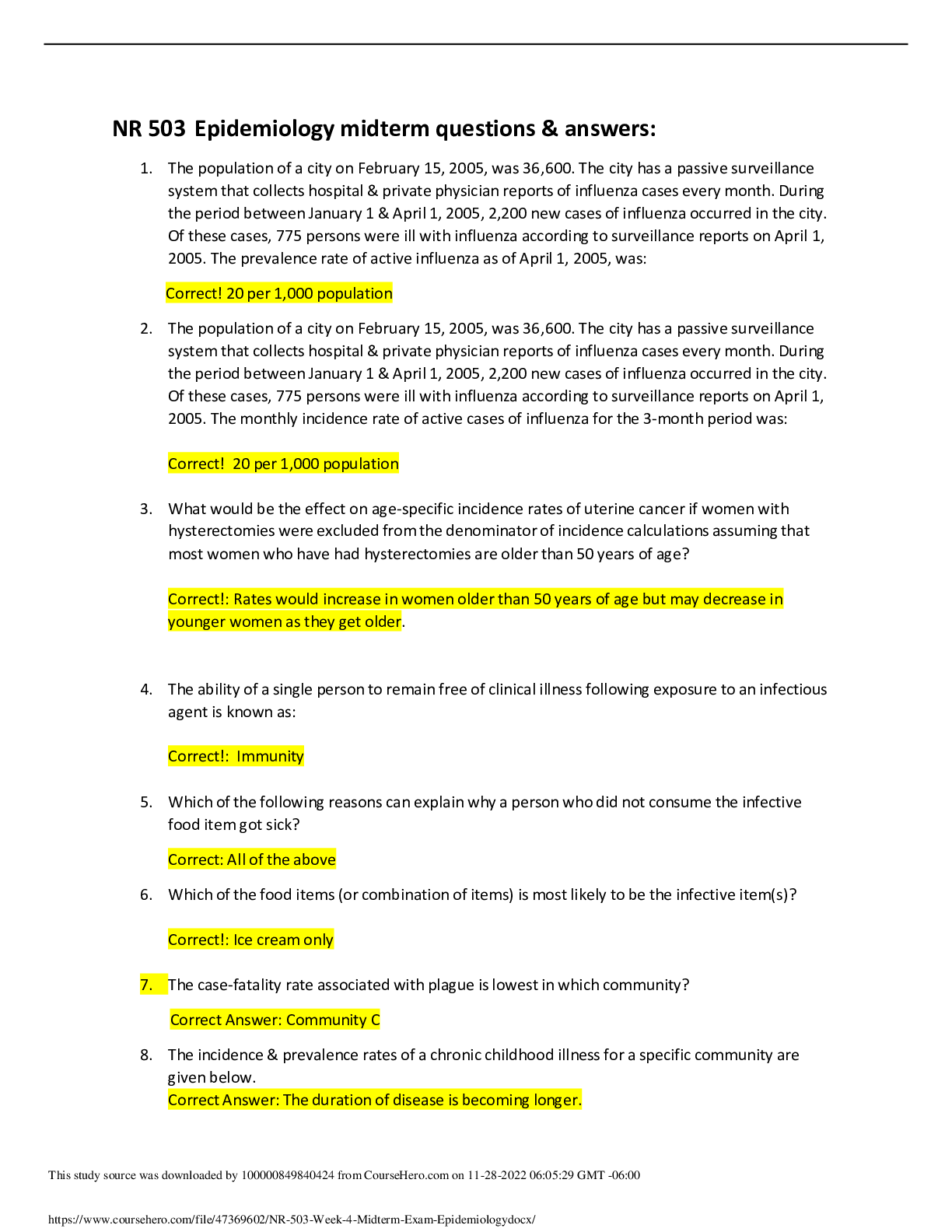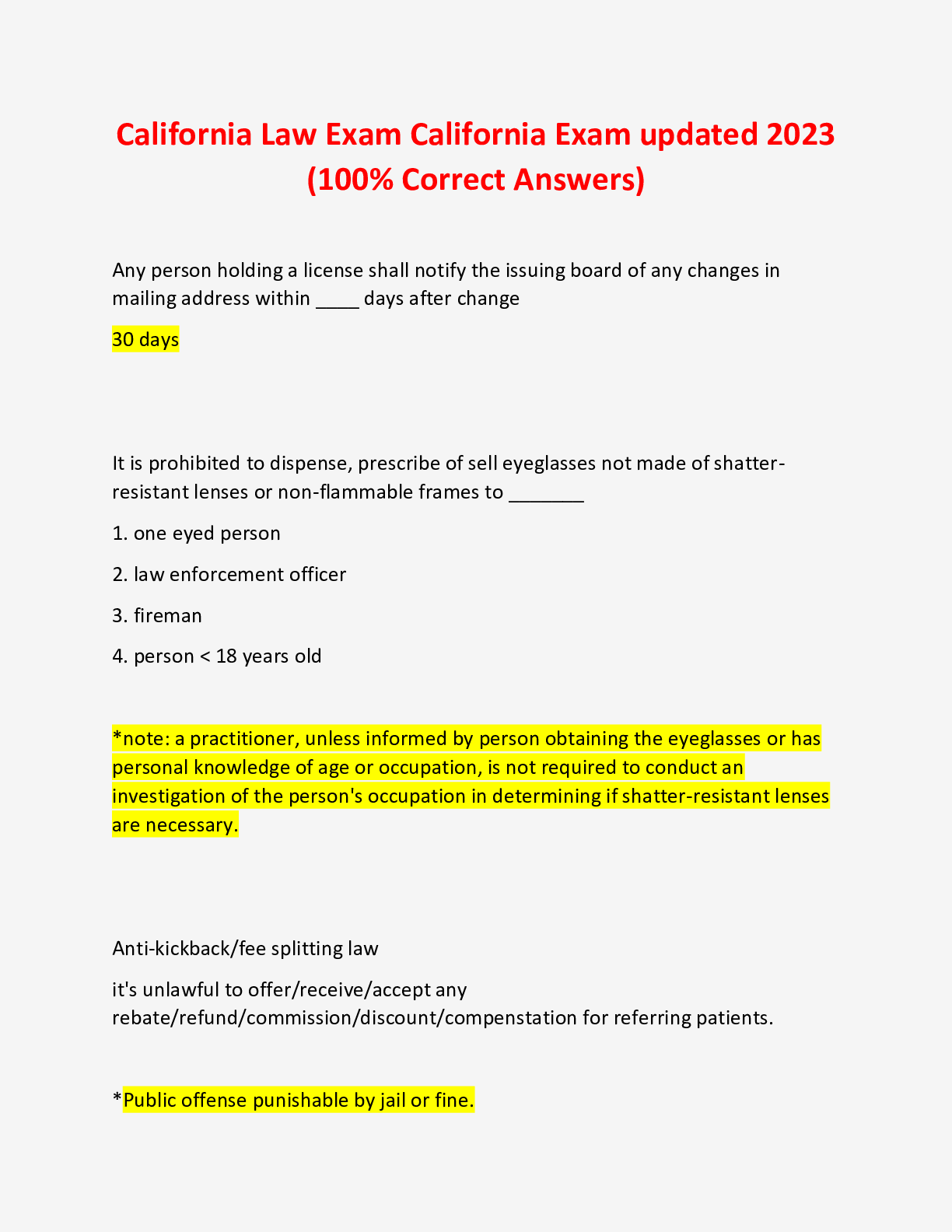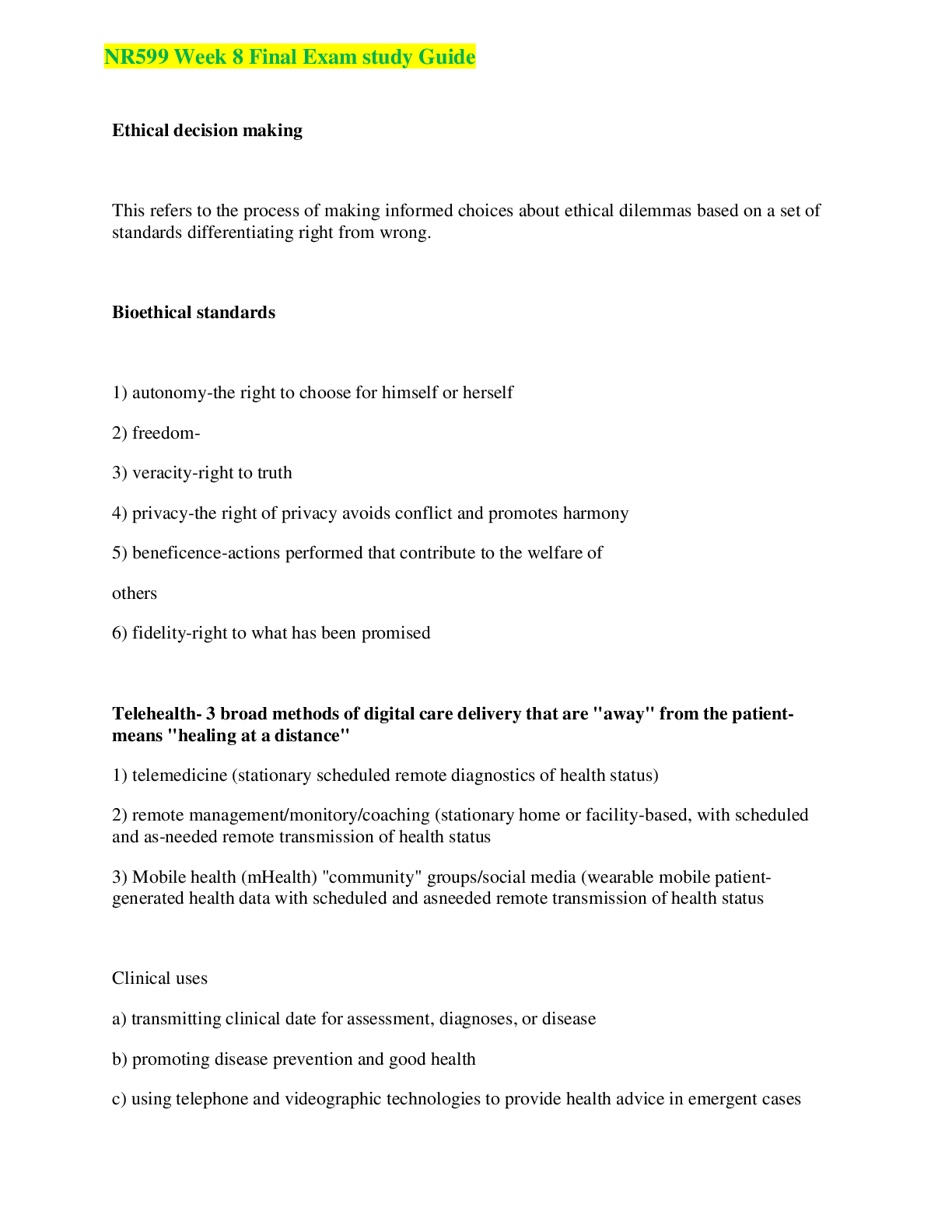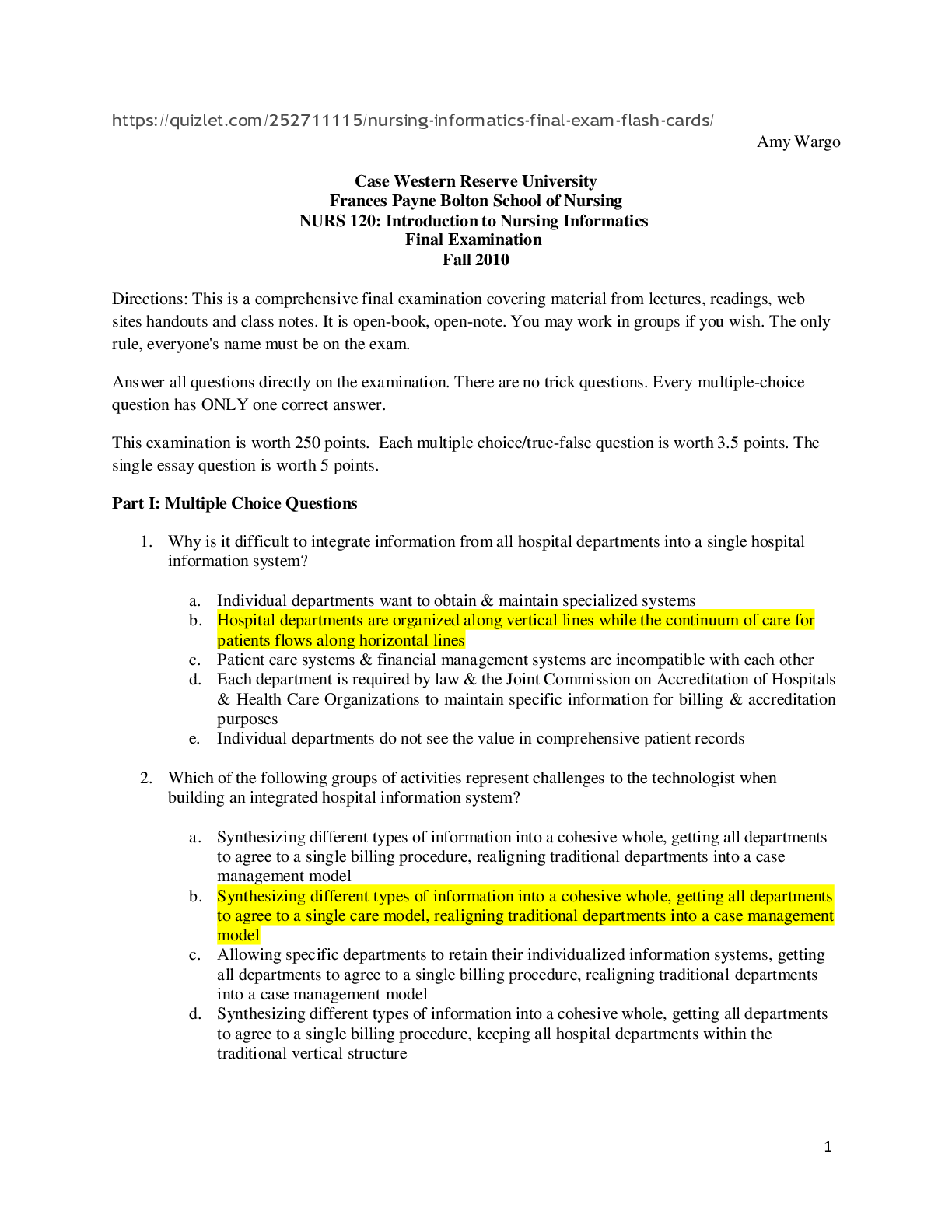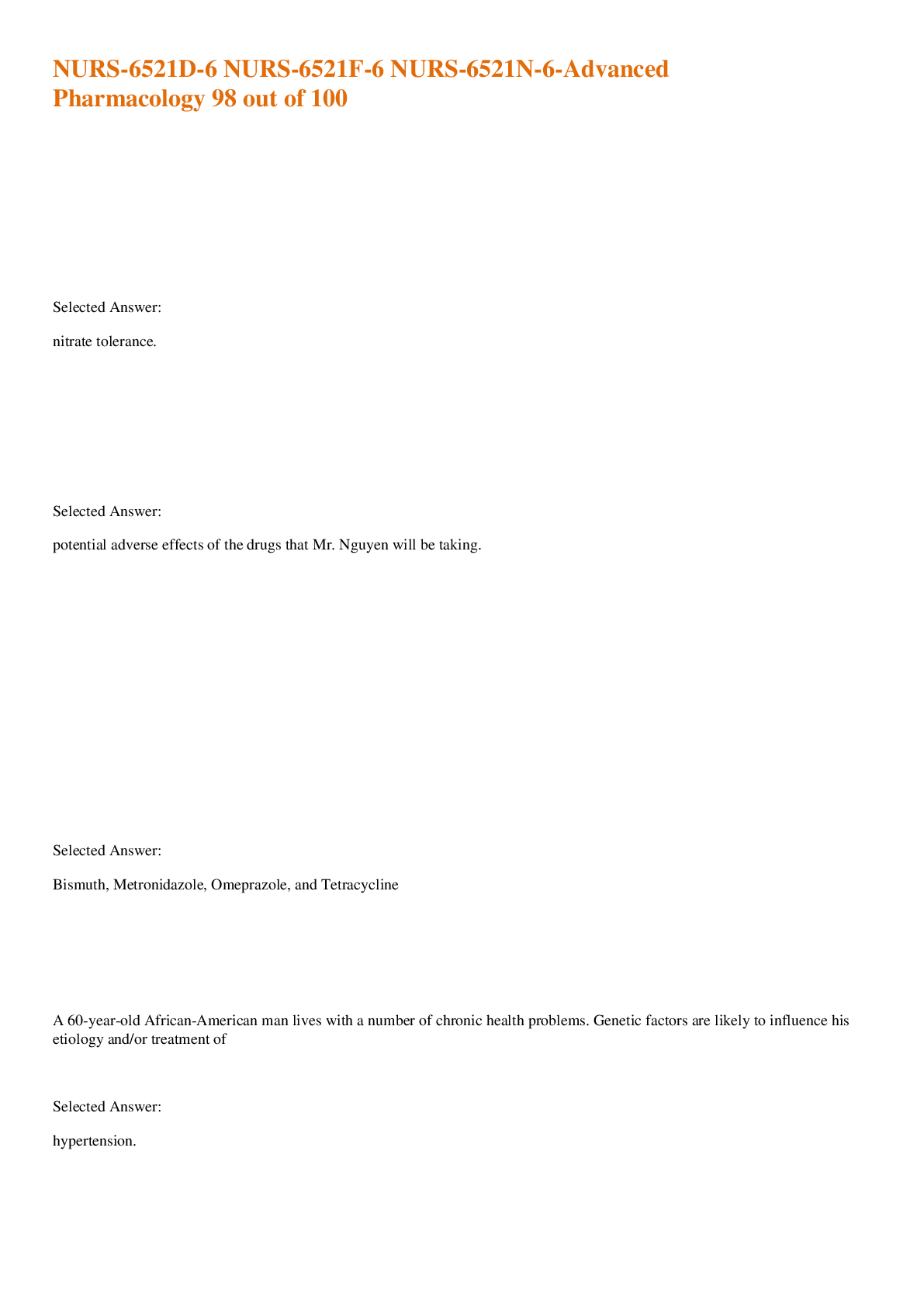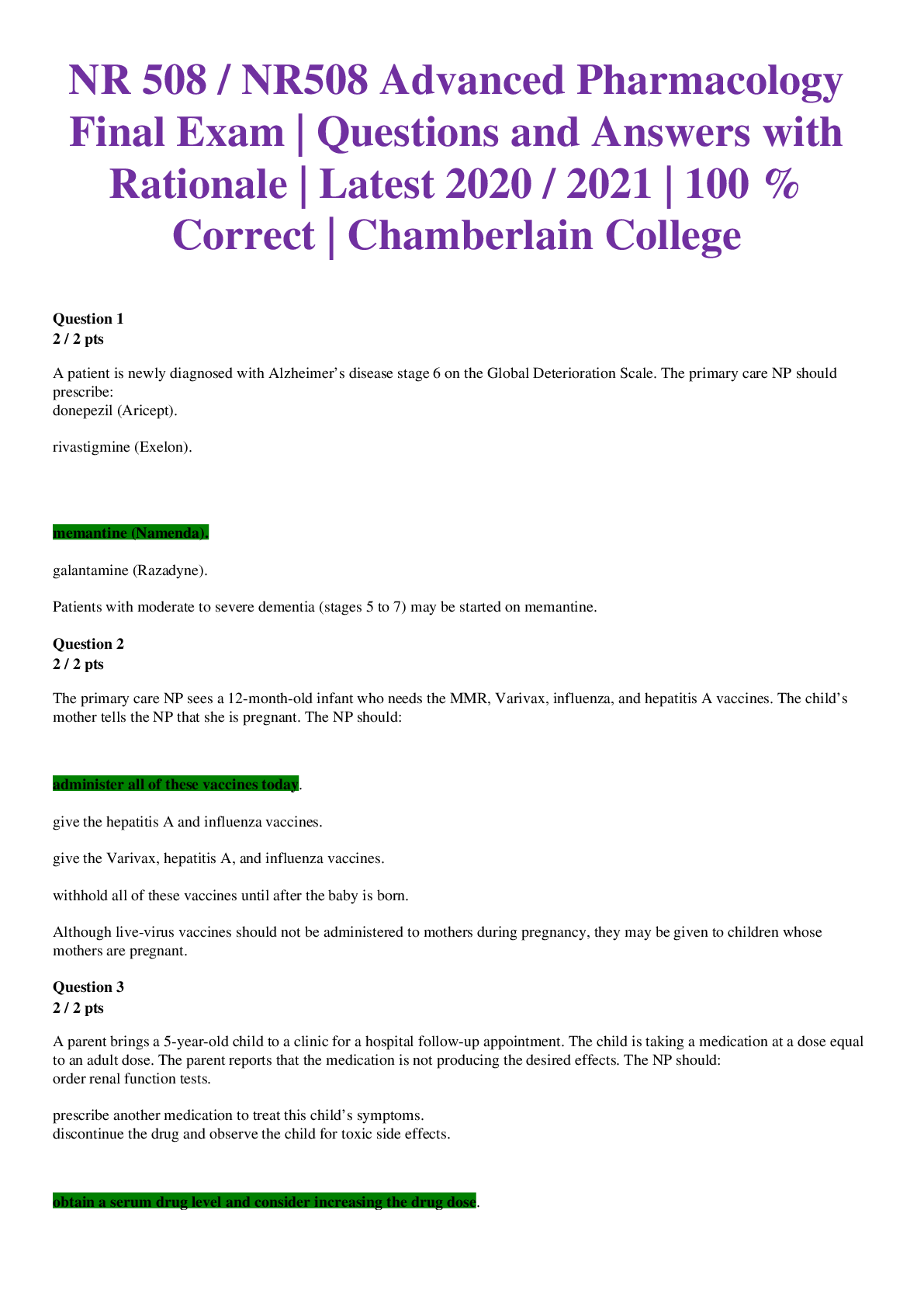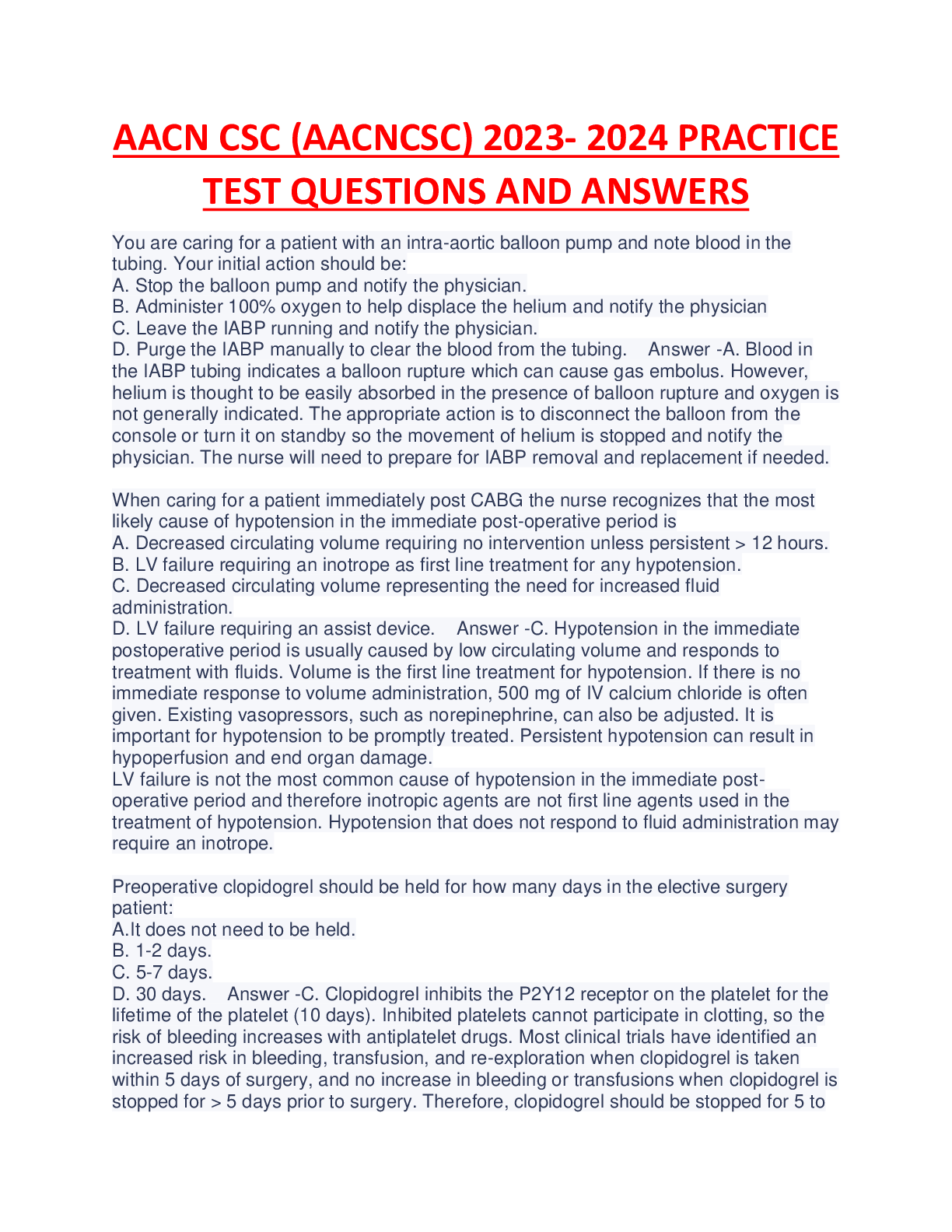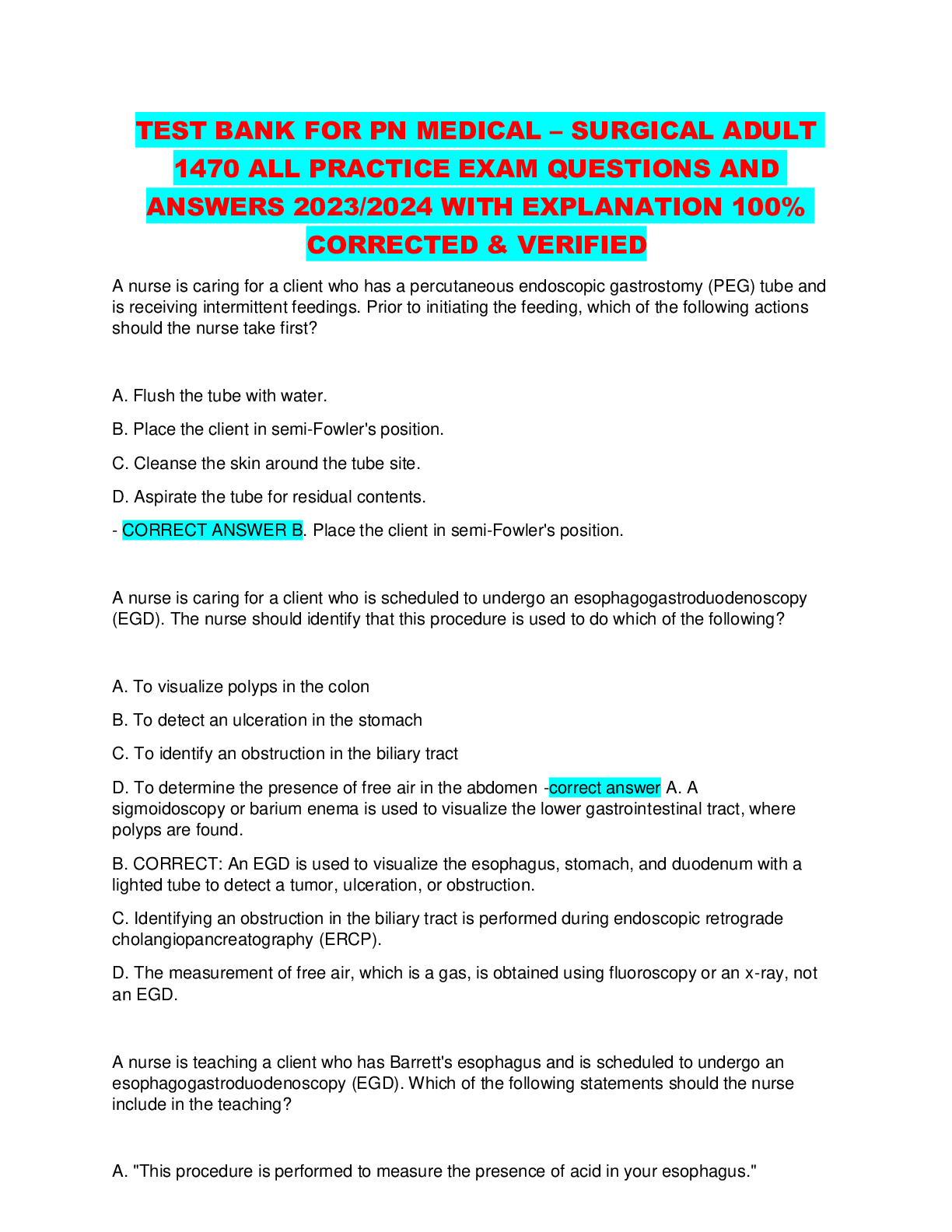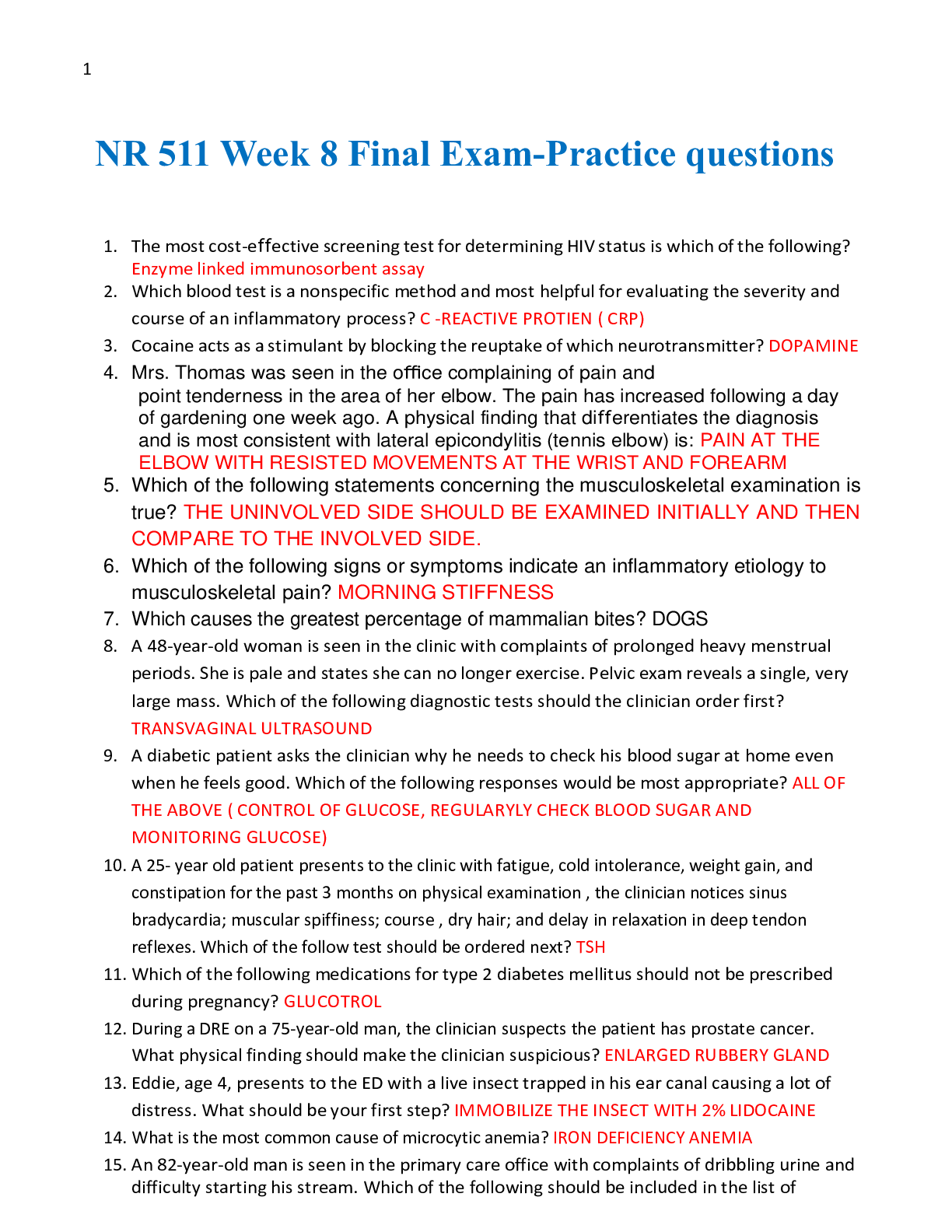Health Care > EXAM > HSM 542 Week 8 Final Exam Questions and Answer elaborations | 100% CORRECT | DeVry University (All)
HSM 542 Week 8 Final Exam Questions and Answer elaborations | 100% CORRECT | DeVry University
Document Content and Description Below
HSM 542 Week 8 Final Exam (CO C) Discuss why it is important to have a patient complete an advanced directive upon admission to a hospital regardless of their age or health condition. Disc... uss why so few patients have an advanced directive on file prior to being hospitalized and the legal implications if one is not completed before a medical procedure. List 2 situations where an advanced directive may be challenged on the basis of ethical OR legal reason. Your Answer: “[A] competent patient has the right to consent (or refuse to consent) to care unless her or others’ safety requires it” (Showalter, 2017, pg. 83). However, when a patient is no longer competent, an advanced care directive becomes a valuable tool for patients, their families and medical professionals. These documents help patients to describe the type of care that they wish to receive for their end-of-life care should they become incapacitated. These directives also provide guidance to family members and medical professions about what the patient wants. When these types of decisions are made in advance, it creates less uncertainty for family members and loved ones who are more able to support the patients’ decision. Sadly however, the majority of people do not have any advanced care directives in place. A major problem with advanced care directives is that they are underutilized. According to the Perelman School of Medicine (which conducted a study in 2017), researchers found that “63% of American adults have not completed one . . . [o]nly 29.3% had completed a living will that contained specific end-of-life care wishes, and 33.4% had designated a healthcare power of attorney”. The study also found that patients with chronic diseases and older patients tended to have them in place, versus healthier, younger patients. Why is this the case? The main issues is simple – people do not want to think about death especially their own. Then to add to that, they do not want to speak to their families about it either. Another issue lies with the difficulty in understanding the perceived complicated terminology around the issue. A striking number of people fail to utilize advanced medical directives, leaving their end-of-life treatment preferences as an unfortunate mystery. Decisions will be made for their care without their input and that care may not be what they would want. One possible situation where an advanced directive may be challenged on the basis of ethical or legal reason is if the patient requests the end of any life-sustaining treatment. Their medical professional may not be able to comply with this request for various reasons, and patients would not receive care they do not want. This type of request would probably be brought to the facilities ethics committee or legal team to ensure they can comply with the request without incurring any liability. Another situation could be as in the case of Kerrie Wooltorton, who lived in the U.K. She is “believed to be the first person to have used a living will to kill herself” (Gabbatt, 2009). In 2007 (September 19), she died from ethylene glycol toxicity (she had swallowed 350 mL of antifreeze). Shortly before ingesting the chemical, she wrote a living will (dated September 14 – just five (5) days prior) in which she stated that with the exception of treatments to make her comfortable, she did not want any medical intervention to save her life. She basically poisoned herself and requested that the hospital do noting to save her life. Though they followed her letter in the U.K., if a case like this were to occur in the U.S. there would be ethical and legal challenges. Sources: Gabbatt, A. (2009). Doctors Acted Legally in 'Living Will' Suicide Case. Retrieved from https://www.theguardian.com/society/2009/oct/01/living-will-suicide-legal (Links to an external site.) Perelman School of Medicine at the University of Pennsylvania. (2017). Two Out of Three U.S. Adults Have Not Completed An Advance Directive. ScienceDaily. Retrieved December 20, 2019 from www.sciencedaily.com/releases/2017/07/170705184048.htm (Links to an external site.) Showalter, J. S. (2017). The Law of Healthcare Administration, Eighth Edition. [VitalSource Bookshelf]. Retrieved from https://online.vitalsource.com/#/books/9781567938777/ (p. 379-438) All 3 parts of the question are answered (e.g., advanced directive importance, legal implications if not completed, and 2 situations where they may be challenged) (CO D) Debate the argument that quality of life is more important than quantity of life. What are the ethical and legal issues in support that quality of life is more important than quantity of life. List 2 patient situations/conditions/diagnoses where quality of life is clearly more important than quantity of life and what you would do in each. Your Answer: What's the purpose of living a long life if most of those years are spent in pain or suffering? This is the argument for quality of life. On the other hand, there are those who believe that people should be glad to live a long life and it doesn't matter how painful it is - as long as you are alive. This difficult argument can sway either way depending on the beliefs and values held by the person expressing them. There can be no right or wrong answer for everyone - it has to be write or wrong for the individual who is experiencing the illness/situation/disease at hand. This was the main debate of the Karen Quinlan case - the case that started the discussion about advanced care directives. At age 22, Karen sustained severe brain damage which left her in a persistent vegetative state with no prospect of a recovery. Her body was locked into a fetal position. Her parents, wishing to "end her suffering", requested that the hospital turn of her life support system and allow her to die. The hospital denied their request and in response, her father filed a suit to become her appointed guardian so that he could authorize the withdrawal of her life support (Kennedy, 1976). The case as appealed all the way to the New Jersey Supreme Court, which ruled in his favor. In 1976, Ms. Quinlan was weaned from the respirator and she continued to breathe on her own until she died nine (9) years later in 1985 from infection and pneumonia. A similar care took place with Nancy Cruzan, who after an automobile accident, she too went into a persistent vegetative state. She could breathe on her own, but had to be fed with feeding tubes. In this case, her parents requested that "the hospital to remove her artificial nutrition and hydration, and allow her to die. When the hospital refused, the parents filed suit to compel termination of the treatment" (Showalter, 2017). After many appeals, her parents won and she died within a few days of being removed from her feeding tube. In my opinion, both of these cases are prime examples of where quality of life is clearly more important than quantity of life. When medical records show that the person has no hope of recovery - will only lay in a bed for the rest of their life, unaware of everything that is happening around them or even who family members are and all the other issues they face when in a persistent vegetative state - then it is time to let them go. Sources: Kennedy I. M. (1976). The Karen Quinlan Case: Problems and Proposals. Journal of Medical Ethics, 2(1), 3–7 Showalter, J. S. (2017). The Law of Healthcare Administration, Eighth Edition. [VitalSource Bookshelf]. Retrieved from https://online.vitalsource.com/#/books/9781567938777/ (p. 379-438) All 3 parts of the question are answered (e.g., quality vs quantity of life debate, ethical and legal issues, 2 patient situations in support of quality of life) (CO E) Health insurance and managed care have changed significantly over the past 50 years. Discuss reasons why these changes were made. Discuss why these changes have not been able to curb the high costs of healthcare. Summarize the ethical and legal issues involved when an insurance/managed care company denies coverage to a patient with medical necessity. Your Answer: The definition of managed care plans as described by Showalter (2017 is very extensive. Managed care plans are "insurance programs that are intended to reduce unnecessary health care costs through a variety of mechanisms, including: economic incentives for physicians and patients to select less costly forms of care; programs for reviewing the medical necessity of specific services; increased beneficiary cost sharing; controls on inpatient admissions and lengths of stay; the establishment of cost-sharing incentives for outpatient surgery; selective contracting with health care providers; and the intensive management of high-cost health care cases. The programs may be provided in a variety of settings, such as health maintenance organizations and preferred provider organizations". Health insurance and managed care have changed significantly over the past 50 years mainly as a response to rising health care costs. As costs began to increase back in the 1980s, employers turned to managed care plans as a way to mitigate the costs. As a result of that, the managed care industry grown as more and more employers jumped on board. According to the Institute of Medicine (1997), managed care has gone through some changes since the 1980s: 1. "The first focused on managing access to health care, primarily using utilization review and administrative barriers such as pre-admission certification. 2. The second phase focused on managing benefits, and in addition to utilization review, added fee-for-service provider networks, selective contracting, and treatment planning. 3. In the third phase, the focus is on managing care, with a shift from utilization review to utilization management and emphasis on appropriateness of care. 4. The fourth phase, which has begun in the last few years, is outcomes management in an integrated services system with a full continuum of treatment services". The main reason why these changes have not been able to curb the high costs of healthcare is due to the excessive administrative costs associated with managed care providers. Another reason, is there are no regulations placed on that industry. They seem to be running a muck. When an insurance or managed care company denies coverage to a patient with a medical necessity, they're doing so for only one reason - profit. They are putting the health and well being of patients behind of the company's desire to make the most money as possible. Patient care is denied if it is deemed too expensive by some arbitrary human being sitting at a desk, the goal of which is to avoid making payments for more costly services just to save a dollar. Sources: Institute of Medicine. 1997. Managing Managed Care: Quality Improvement in Behavioral Health. Washington, DC: The National Academies Press. doi: 10.17226/5477. Showalter, J. S. (2017). The Law of Healthcare Administration, Eighth Edition. [VitalSource Bookshelf]. Retrieved from https://online.vitalsource.com/#/books/9781567938777/ (p. 1-59) All 3 parts of the question are answered (e.g., reasons for insurance changes, reasons changes were unable to thwart high costs of healthcare, legal/ethical issues involved in claim denial) (CO H) Summarize the primary ethical and legal criticisms related to the Affordable Care Act of 2010 (aka Obama-Care). Provide a list of reasons why the U.S. has not adopted universal healthcare like many other countries. Make 2 suggestions for legislation that would improve access to healthcare without compromising quality or adding to already high costs. Your Answer: According to Showalter (2017), "the Affordable Care Act (ACA) was intended to expand US citizens’ and legal residents’ access to health insurance coverage, control future costs, and improve the functioning of the healthcare delivery system." It represents the first far-reaching health care coverage that has been undertaken since 1965. Some ethical and legal criticisms about the act relate to the fact that because pre- existing conditions are covered, can employers make health coverage available to their employees at affordable rates? The rates will affect all their employees, so why should an unhealthy smoker with diabetes get the same rate as a healthier co-worker? Will individual rates have to depend on the health history of each specific employee? In addition to these questions, we must also consider that federal and state government plans provide little or no coverage for residents and the costs of employer-provided coverage continues to climb. Another cost issue is the rising price of necessary medication, (i.e. insulin and other medication that many patients require in order to live). "Except for the United States, the largest advanced economies in the world all provide a heavily subsidized universal health care system, that is, a publicly funded system that provides primary health services to all, usually at a nominal fee only and with no exclusions based on income or wealth" (Ethical Issues, 2018). The main legislative suggestion I feel would improve access to healthcare without compromising quality or adding to already high costs would be to force healthcare companies to standardize their costs across the country. Healthcare is a service and costs should be adjusted based on the markets they serve, not just how much money they can make. Another suggestion would be to create a new un-privatized healthcare system. According to Ethical Issues (2018), "approximately 83 percent of health care expenses [in the U.S. are] provided by the private sector through insurers and employers". Historically, unlike other countries who have been successful at creating universal healthcare plans for their citizens, the U.S. relies heavily on private providers. Sources: Ethical Issues In the Provision of Health Care – Business Ethics. (2018). Retrieved from https://opentextbc.ca/businessethicsopenstax/chapter/ethical-issues-in-the-provision-of- health-care/ Showalter, J. S. (2017). The Law of Healthcare Administration, Eighth Edition. [VitalSource Bookshelf]. Retrieved from https://online.vitalsource.com/#/books/9781567938777/ (p. 61-112) All 3 parts of the question are answered (e.g., ethical/legal criticism summary, list of reasons, 2 suggestions to improve access) (CO A) Discuss the ethical and legal controversy over "growing organs" where stem cell research has advanced to make it possible to grow replacement organs instead of going on an organ transplant list. Discuss reasons for legalizing this procedure universally. Discuss reasons against legalizing this procedure universally. Your Answer: As defined by Showlater (2017), "Stem cells are basic units of living matter that, remarkably, have the potential to develop into many types of cells in the human body. They also serve as a kind of internal repair system, dividing virtually without limit to replenish other cells as long as the person is still alive." I believe the main ethical and legal controversy of "growing organs" (organoids ) has to do with the belief that the stem cells used for this type of work is derived from aborted fetuses. "Until recently, scientists worked primarily with embryonic stem cells— those created for reproductive purposes through in vitro fertilization (IVF) and then donated for research with the informed consent of the donor" (Showalter, 2017). Organoids are typically grown from a patient’s stem cells, so that it will be compatible with the patient's body and have less chance of being rejected. According to Gent (2017), these organoids can be grown from many different types of tissue (i.e. liver, kidney, pancreas, brain tissue, etc.). They can be used not only to repair damaged organs or used to test out reactions to different drugs. As great as this sound however, the problem with them is that these organoids "fail to replicate important features of real organs, such as blood vessels, nerves and immune cells, and also can’t replicate the interactions between organs that a body, animal or human would" (Gent, 2017). Reasons to legalize this procedure include making the information more transparent to everyone, creating standardization for practices and laws that would have to be followed and create an agency to police those doing this type of work. However, legalizing the procedure would also raise its own issues. According to Gent (2017) "[m]aintaining a steady supply of organoids for both medicine and research will require the creation of biobanks stocked with donated tissue, which will raise complicated challenges regarding donor consent and ownership." Another issue to consider is where would medical care start and research end? These lines will blend as more work is done in this area. Sources: Gent, E. (2017). The Ethics of Organoids: Scientists Weigh In On New Mini- Organs. Retrieved from https://singularityhub.com/2017/01/27/the-ethics-of-organoids- scientists-weigh-in-on-new-mini-organs/ (Links to an external site.) Showalter, J. S. (2017). The Law of Healthcare Administration, Eighth Edition. [VitalSource Bookshelf]. Retrieved from https://online.vitalsource.com/#/books/9781567938777/ (p. 505-538) All 3 parts of the question are answered (e.g., ethical and legal controversy, support for legalizing, reasons against legalizing) (CO B) Discuss the ethical and legal controversy over "medically assisted procreation" where technology allows the possibility for creating life when it is naturally impossible. Discuss reasons in support of medically assisted procreation. Discuss reasons against medically assisted procreation. Your Answer: I think one of the main ethical and legal controversy over "medically assisted procreation" is the ideal that medical professionals are playing God by developing this technology. They not only have the power to create life, but they also decide death as they pick and choose which embryos get to live or die. Many embryos that are created never get the chance to become a child. Another issue that comes up lies with the probability that multiple babies could result from an implantation of embryos. Typically, multiple embryos are implanted to increase the chance of having one successful pregnancy. But many times, multiple embryos survive and many times, those embryos split and become twins or triplets. The obvious reason to support medically assisted procreation is to give couple the chance to become parents. As a woman who was once told I would never have children, I fully understand the deep desire many couples have to become a family. Another argument is if we can help people to become parents, why would we not help them? It would be cruel to have the technology to make it happen and not help people in nee. On the other hand over, many argue that this process is "unnatural" and "not a part of God's plan". They feel that man should not interfere with the work of God and just because we can do it, doesn't mean we should. Source: Harper, J. C., Geraedts, J., Borry, P., Cornel, M. C., Dondorp, W., Gianaroli, L., ... Jr. (2013). Current Issues in Medically Assisted Reproduction and Genetics in Europe: Research, Clinical Practice, Ethics, Legal Issues and Policy: European Society of Human Genetics and European Society of Human Reproduction and Embryology. European Journal of Human Genetics, 21(Suppl 2), S1. doi:10.1038/ejhg.2013.219 (p. 505-538) All 3 parts of the question are answered (e.g., ethical and legal controversy, support for, reasons against) (CO F) Discuss why EMTALA (Emergency Medical Treatment and Active Labor Act) was originally passed. Debate whether this law is fair to hospitals/providers working in inner city or rural locations. Make an argument for or against changing EMTALA law based on ethical considerations for all stakeholders impacted. Provide one example of how EMTALA law negatively impacts a stakeholder of your choosing (e.g., patient, provider, insurance company, etc.). Your Answer: Congress enacted the Emergency Medical Treatment & Labor Act (EMTALA) in 1986 to help ensure that the public would have access to emergency services regardless of ability to pay. According to Showalter (2017), "The law is consistent with the philosophy that healthcare at the time of an emergency is a moral right and must be provided regardless of the patient’s ability to pay." "The purpose is to screen and treat the emergency medical conditions of patients in a non-discriminatory manner, regardless of ability to pay, insurance status, national origin, race, creed or color" (Latner, 2015). This law on its surface, is trying to help, but in inner cities or rural locations, where the populations tend to be poorer, hospitals in these areas are facing a big problem. The chance of their patients not being able to pay for emergency care is extremely high, not only in real emergencies but also in instances where patients use the emergency room as their doctor's office. Everything can become an emergency. These hospitals end up loosing any revenue from the treatment they give to these non paying patients. As a result the business suffers as does the moral of the medical staff working at these locations. They can become jaded and dissatisfied with their work and burn out quickly. This creates its own problems. Sources: Latner, JD, A. W. (2015). Law 101: Emergency Medical Treatment and Active Labor Act (EMTALA). Retrieved from https://www.empr.com/home/features/law-101-emergency- medical-treatment-and-active-labor-act-emtala/ (Links to an external site.) Showalter, J. S. (2017). The Law of Healthcare Administration, Eighth Edition. [VitalSource Bookshelf]. Retrieved from https://online.vitalsource.com/#/books/9781567938777/ (p. 347-378) All 3 parts of the question are answered (e.g., EMTALA fairness, argument for/against changing EMTALA, example of negative EMTALA impact) (CO G) In a lawsuit happy society, everyone is to blame. But are they? Consider the case where a patient does not follow doctor's orders for wound care (i.e., difficult to prove) and acquires a post-operative infection that requires another medical procedure. What is the burden of proof needed for the malpractice lawsuit to go forward? Who could be named in the lawsuit? Provide rationale for why malpractice reform should be passed and what that reform would consist of (i.e., damage award limits, pre-judicial validation, etc.). Your Answer: The burden of proof would fall on the defendant who is filing the lawsuit. It is up to that person to prove that they not only followed their wound care orders, but that following those orders resulted in harm. The people named in the lawsuit may include the team of medical staff who performed the surgery (if applicable the doctor, nurses, anesthesiologists and anyone else in the room at the time of the operation), the medical professionals who discussed the wound care instructions with the patient, the hospital and possibly the hospital board. Outside of instances where medical professionals were truly negligent in their work, damage award limits should be instituted to help control the costs that are associated with malpractice insurance costs. Having the case and issues involved examined by an outside party prior to going into court or arbitration can be another step to help with malpractice reform. (p. 217-252) All 3 parts of the question are answered (e.g., burden of proof, list of defendants, malpractice reform rationale and parameters) [Show More]
Last updated: 1 year ago
Preview 1 out of 10 pages
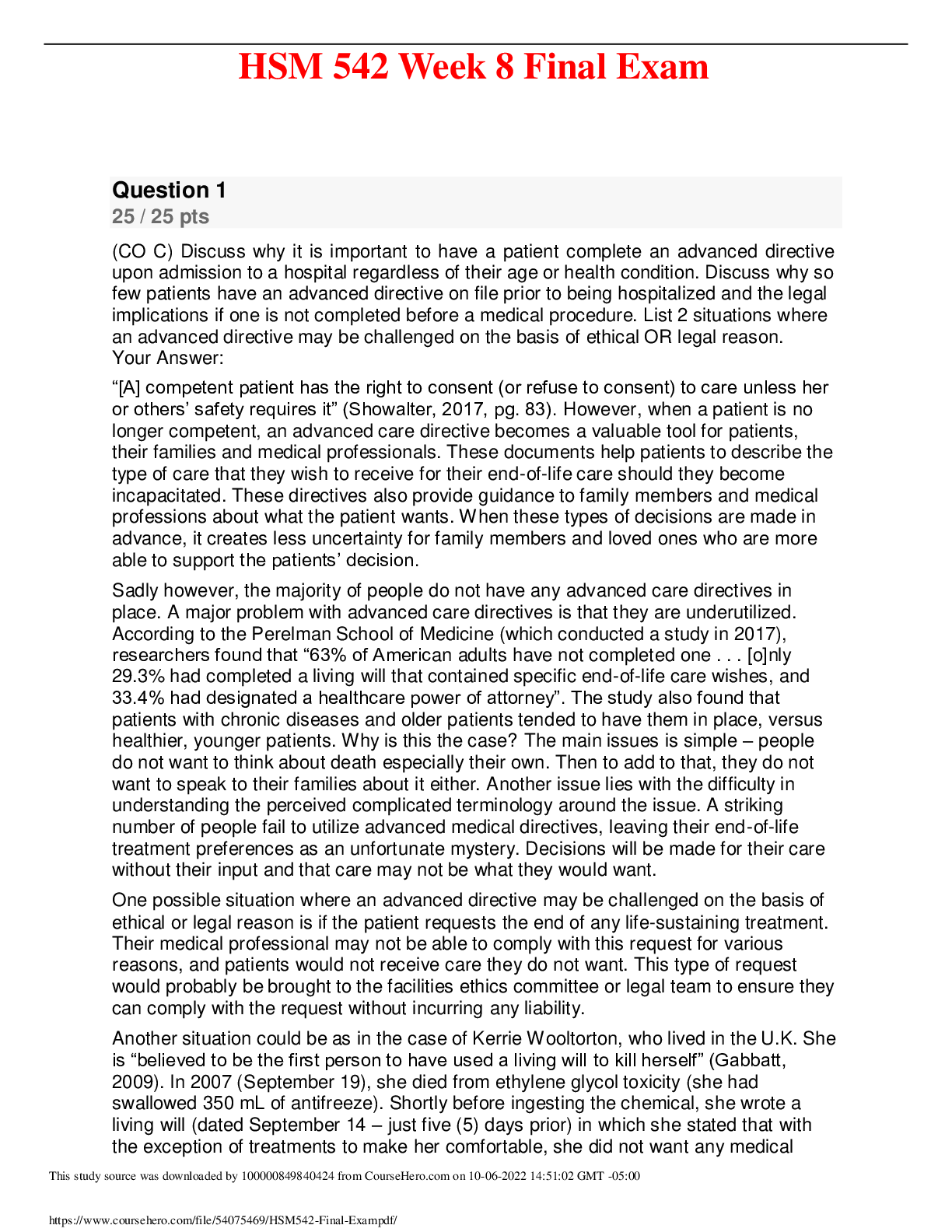
Reviews( 0 )
Document information
Connected school, study & course
About the document
Uploaded On
Oct 07, 2022
Number of pages
10
Written in
Additional information
This document has been written for:
Uploaded
Oct 07, 2022
Downloads
0
Views
60




.png)

